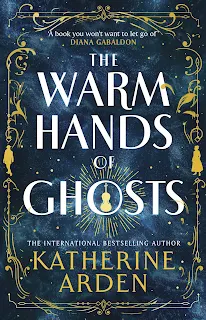* Copy courtesy of Penguin Random House *
Intro
You're not seeing things, what follows is a review of an historical fiction novel set during WWI. I know I've said here on Carpe Librum that I'm - mostly - on a break from WWI and WWII historical fiction, however such is the power of Katherine Arden that I made an exception.Last year I reviewed The Bear and the Nightingale by Katherine Arden and fell in love with the writing style of this YA urban fantasy / historical fiction series. The Bear and the Nightingale earned a glowing 5 star review and I'm still looking forward to reading the next book in the Winternight trilogy The Girl In The Tower. Therefore I was surprised to see the author pop up in a publisher's catalogue with an adult title The Warm Hands of Ghosts. Seeing it was an historical fiction novel set in WWI, I was keen to see how - or if - the author would bring her love of Russian myths and legends and sense of 'other' to a bloody war and now I have my answer.
Review
I shared this back story because I didn't know what to expect - other than great writing - reading The Warm Hands of Ghosts by Katherine Arden. It's quite possible that if I'd known just how dark the book was going to be, I might not have requested it for review. Having said that, going in blind was the best approach for me and I'm glad I read it.Laura Iven is a Canadian nurse providing medical care to the soldiers on the Western Front during WWI when she is injured during the bombing of a hospital, discharged and sent back home to Halifax in Canada to recover.
The snappy writing and depth of character was immediately present in the author's writing. Here's one of my favourite observations by Laura:
"Laura tried not to look cynical. Pim appeared simultaneously flattered, delighted to make his acquaintance, and innocently unavailable. She'd probably practiced that expression in a mirror." Page 91Laura's brother Wilfred (Freddie) is a soldier serving in Belgium and after receiving contradictory news and fearing he might be missing, she risks another deployment and travels back to Belgium in search of him. Volunteering at a private hospital in Flanders, Laura and her colleagues struggle to stay on their feet working for days without rest in the gruelling conditions. Laura speaks to the men as she tends to their wounds and starts to hear strange stories about the Fiddler.
The novel is set in alternate chapters with Laura in present day January 1918 and Freddie's point of view from several months earlier enabling the reader to discover what happens to him. Incorporating elements of the Halifax Harbour explosion from history was a refreshing angle I hadn't come across in WWI literature and it was interesting to learn more about this disaster from the character's perspective.
Laura's brother was named Wilfred in the novel and every time I saw his name on the page I reacted with 'oh, I thought that was going to read Wilfred Owen.' I studied the works of WWI poets Wilfred Owen, Siegfried Sassoon and Robert Graves in a War Literature course at University so I felt rewarded when I noted the following in the Afterword:
"Her brother's name, Wilfred, is a hat-tip both to Ivanhoe and to Wilfred Owen, whose poem "Strange Meeting" was the starting point for Freddie's story." Afterword, Page 378What a terrific tribute to the poet and for those interested, you can read Wilfred's short poem Strange Meeting in full on the Poetry Foundation website.
The Warm Hands of Ghosts by Katherine Arden is difficult to read at times. It's brutal and graphic yet also tender and achingly beautiful while accurately conveying the destruction and hopelessness of war without flinching away from the horror. Reading this in the lead up to ANZAC Day enhanced my sense of gravitas while reading but the kiss at the end was one step too far for me.
Highly recommended for experienced readers of WWI historical fiction with a strong stomach looking for a new story that stands apart from the rest. Not sure? Read a free EXTRACT.




































Years ago I started listening to an audio from this author but I didn't get very far and I don't know why. One day I will start again as she does sound like my kind of storyteller!
ReplyDeleteThanks for sharing your review with the Historical Fiction Reading Challenge
Hi Marg, not sure what the audiobook for this is like but I hope you give the author another chance. Perhaps a print version might work better for you and the descriptions are wonderful on the page.
DeleteFrom the massive Halifax harbour explosion in Canada to the end of the first world war, Arden's elegant style illuminates the dark depths of her characters. At moments reminiscent of Jacqueline Winspear's Maisie Dobbs' experiences, Arden brings the horrors of shell-shock to the fore and her mysterious evil violinist who robs the troops of their memories to inspire his 'music' provides a numbing sense of the thin line between sanity and brutal experience.
ReplyDeleteThank you again, Tracey, for bringing this author to my attention.
You're very welcome Neil, I was hoping you'd enjoy Arden's writing style and very different yet penetrating WWI novel.
Delete